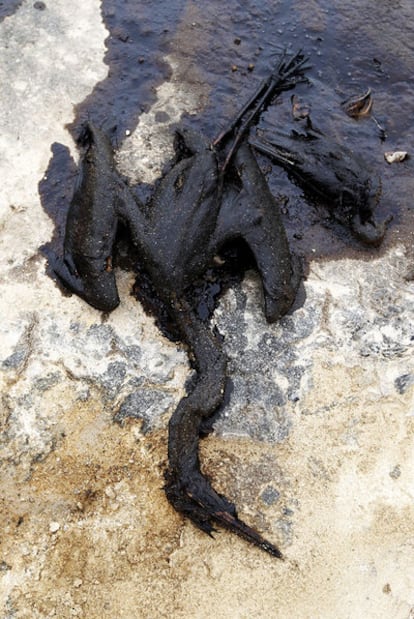Birds trapped in the Madrid government's lake of death
Water at Boca Alta remains contaminated by oil, two years after its purchase
Exactly two years ago on Thursday, regional environment director, Federico Ramos, went to inspect a lake located in the Boca Alta zone of a park in southeast Madrid, a few kilometers outside Arganda del Rey. The environment chief posed by the side of a lake of oil and announced with great fanfare the regional government's acquisition of the 6.4-hectare area of land with the aim of revitalizing the fetid body of water.
But words are one thing, and actions quite another. Two years later the lake, which is about the same size as the Santiago Bernabéu soccer stadium (1.2 hectares), is in a horrific state. The shore is littered with dead birds of various species, covered in the oil that coats the water. A foul stench pervades the air, born of a mixture of industrial oil and gasoline. The banks of the lake are spattered with discarded barrels of chemical products. The water, if it can be described as such, is a grayish hue and like a mirror, reflecting the clouds overhead.
"Studies and analyses have been carried out to see what exactly is in the lake"
The regional government has asked the EU Life Project for funding
Last week, residents of the area visited the lake to test the state of the liquid therein. There they encountered a species of spoonbill duck in the throes of death as it struggled to free itself from the quagmire. The animal was taken to the threatened species center at Tres Cantos, although it is unlikely to survive due to the high acidity of the liquid.
The residents' group also found dozens of other birds, including endangered herons, coated in the vile slick. When the residents alerted a forest ranger patrol it reported the scene to authorities, according to a ranger who prefers not to be identified.
On Wednesday, a spokesperson for the regional environment department said the Madrid government was taking action. "Studies and analyses have been carried out to see what exactly is in the lake. The work is still in progress."
Residents of the zone have filed a complaint with the Environmental Prosecutor in Madrid, which ordered the Civil Guard to investigate. They have also alerted the Tagus Hydrographic Confederation, because they believe the enormous oil slick could be leaking into nearby wells and lakes through the water table.
Elena, an environmentalist who lives in the area, has taken it upon herself to recover the bodies of the dead animals littering the environs of the lake. She intends to carry out a census of what she finds. "They could have put scarecrows or lights up so that birds don't set down on the lake when they come to drink," she says.
"We have put up a mesh to try to stop the situation. We also laid sound sensors but they didn't work either," says the environment department.
The situation at the Boca Alta lake is nothing new. Ecologists have spent years trying to bring the situation to the attention of authorities. Ignacio Otero, of the ecological NGO Grefa, says that some 20,000 birds have died at the lake since the 1980s. He believed that when the regional government bought the land two years ago, for about 50,000 euros, the problem would be addressed.
Not so. A spokesperson for the regional environment department justifies the situation thus: "The autonomous community of Madrid acquired the land in February 2009 to recover the area. Studies of the composition of the liquid residues have been carried out to determine the viscosity, humidity and volatility of the water and to determine the quantity of ash and hydrocarbons." The government has proposed building a treatment plant for residues. The environment department argues the process is costly and technically difficult - government analysts estimate it would cost around 20 million euros. "We have asked for funding from European Union Life Project funds," says the spokesperson.
The contamination of the lake began in the middle of last century, when industrial extraction companies began to tear up the land in the area. When the water table was reached, the gravel pits were filled with water to create artificial lakes. Some were rehabilitated, such as the lakes in the Porcal area, which today support thousands of species.
But in the 1980s at the Boca Alta lake two oil-treatment and recycling companies, Uribarri and Piqsa, set up shop, according to the regional government. For years, they dumped waste in the lake while stressing their commitment to environmental responsibility. The plant was shut in 1997 and for more than 20 years now the lake has been covered in a noxious patina.
Two years ago Ramos said the lake had been acquired to recover one of the region's greatest biodiversity sites. "We have faced up to a problem," his department says today.

Tu suscripción se está usando en otro dispositivo
?Quieres a?adir otro usuario a tu suscripción?
Si continúas leyendo en este dispositivo, no se podrá leer en el otro.
FlechaTu suscripción se está usando en otro dispositivo y solo puedes acceder a EL PA?S desde un dispositivo a la vez.
Si quieres compartir tu cuenta, cambia tu suscripción a la modalidad Premium, así podrás a?adir otro usuario. Cada uno accederá con su propia cuenta de email, lo que os permitirá personalizar vuestra experiencia en EL PA?S.
En el caso de no saber quién está usando tu cuenta, te recomendamos cambiar tu contrase?a aquí.
Si decides continuar compartiendo tu cuenta, este mensaje se mostrará en tu dispositivo y en el de la otra persona que está usando tu cuenta de forma indefinida, afectando a tu experiencia de lectura. Puedes consultar aquí los términos y condiciones de la suscripción digital.








































